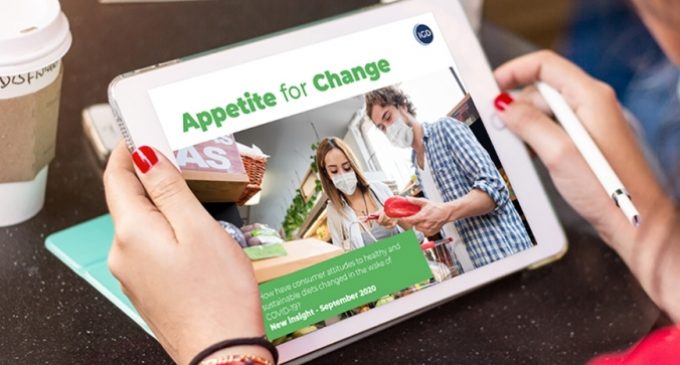Appetite For Healthier Diets Remains in the Wake of COVID-19

New research released by IGD reveals there is still a significant appetite for change among UK consumers to shift towards healthy and sustainable diets, as they continue to grapple with the impact of COVID-19. IGD’s new consumer research draws on data from more than 1,000 UK consumers collected in July 2020 to explore the impact of COVID-19 on attitudes to healthy and sustainable diets. This research builds on IGD’s Appetite for Change report, released in March 2020 and based on data gathered in November 2019.
Highlights include:
- Over half of consumers (57%) are already changing their diets or are considering making changes to be healthier and more sustainable, down from 66% in 2019
- There has been a shift in how healthy consumers perceive their diets to be, with people feeling their diets are less healthy during lockdown than in 2019
- Health is now an even bigger motivator for consumers to improve their diet in the wake of COVID-19, with nearly two-thirds (63%) of people citing health as their primary driver up from 58% in 2019
- Perceived higher cost remains the main barrier to healthy and sustainable diets, with 38% of consumers thinking it is more expensive.
Hannah Pearse, Head of Nutrition and Scientific Affairs at IGD, says: “We faced significant health and environmental challenges before COVID-19 and the global pandemic has brought these issues into the spotlight. Not only has COVID-19 highlighted our reliance on an effective and efficient food supply chain, but also reinforced that our diets are inextricably linked with our health. Evidence has shown that people living with obesity are 50% more likely to die from COVID-19 and to help combat this, the government has launched a new strategy to reduce obesity.
“This is why IGD continues to work extensively with behaviour change experts, the food industry and consumers to understand how we can shift consumer behaviour towards healthier and more sustainable diets.
“Appetite for Change reveals consumers fall into three mindsets; those who are making changes to be healthier and more sustainable, those who are considering it and those who see no reason to change. More than half (57%) of people in the UK continue to be open to making changes to what they eat and drink despite the uncertainty of COVID-19, proving there is still a big opportunity for food and grocery companies to help transition consumers to healthier diets.”
With the advent of COVID-19, there has been a significant shift in the value placed on personal health for parents, with 35% of parents valuing their own health as the primary motivator to eat healthily and sustainably in 2020 compared to 24% in 2019. In turn, the importance that parents place on their family’s health has fallen to 31% in 2020 from 39% in 2019, potentially reflecting the lesser impact of COVID-19 on children’s health compared to adults.
Some 38% of consumers perceive healthy and sustainable eating to be more expensive, meaning perceived cost continues to be the biggest barrier to change. Other barriers include people liking the taste of their current food (24%), being creatures of habit (23%) and a lack of familiarity (17%).
Hannah Pearse adds: “There remains a huge opportunity to start shifting people’s behaviour towards healthier and more sustainable diets and never has there been a stronger impetus for change. We’ve identified practical steps the food and grocery industry can take to encourage behaviour change; we’re currently working with companies to test different approaches and we’ll share best practice as it emerges. Our impact will be much greater if we come together to drive the change required, so I encourage companies to use our research and resources and contact us to understand more.”
The updated consumer research is available to download at igd.com


































